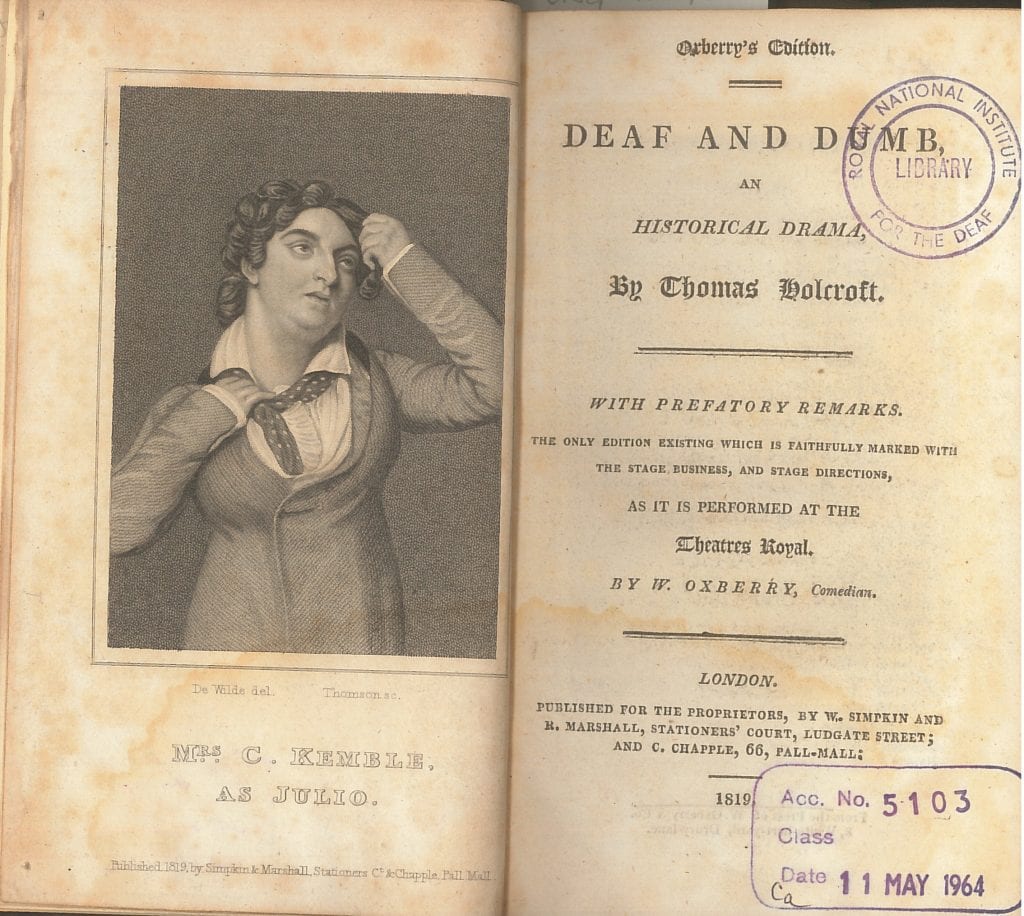Holcroft’s “Deaf & Dumb; or The Orphan Protected” 1819
By H Dominic W Stiles, on 21 September 2018
 Thomas Holcroft was born in Orange Court, Leicester fields on December 22nd, 1744, son of a shoemaker (see introductory remarks to the play, p.ii). He was employed by a Mr Vernon riding his horses at Newmarket, but the continued to work in his father’s trade and educate himself in music and painting. In his mid-twenties his interest was captured by the theatre. In 1802 (according to the date on the cast list) he produced an adaptation of Bouilly’s 1799 play, L’Abbé de L’Épée. A previous blog noted the prose version of this story – Harancour Place; or the Orphan Protected. It is, we are told in the introductory note (perhaps by Oxberry I wonder), “a sort of sentimental pantomime, exquisitely happy in the construction of the fable and tender in the sympathy it inspire; and may be considered as a practical test how far situation and feeling alone will go to the production of the most powerfulb and even refined dramatic effect, without the help of poetry or impassioned dialogue.” (p.i)
Thomas Holcroft was born in Orange Court, Leicester fields on December 22nd, 1744, son of a shoemaker (see introductory remarks to the play, p.ii). He was employed by a Mr Vernon riding his horses at Newmarket, but the continued to work in his father’s trade and educate himself in music and painting. In his mid-twenties his interest was captured by the theatre. In 1802 (according to the date on the cast list) he produced an adaptation of Bouilly’s 1799 play, L’Abbé de L’Épée. A previous blog noted the prose version of this story – Harancour Place; or the Orphan Protected. It is, we are told in the introductory note (perhaps by Oxberry I wonder), “a sort of sentimental pantomime, exquisitely happy in the construction of the fable and tender in the sympathy it inspire; and may be considered as a practical test how far situation and feeling alone will go to the production of the most powerfulb and even refined dramatic effect, without the help of poetry or impassioned dialogue.” (p.i)
The story involves the boy Thomas, educated by l’Epée, (spoiler alert) who is really Julio, Count of Harcour. In the original French version, the Deaf boy uses gestures. “These gestures do not replicate the sign language de l’Épée taught to his students, but neither are they conventional theatrical gestures. They are instead a hybrid: a theatrical gesture rendered so as to appear to replicate the manual language of the deaf as well as a transformation of de l’Épée’s manual language for the deaf into gestures that would work on a large stage” (McDonagh). Holcroft’s version seems to have the boy – played by Miss De Camp in the original – doing something more akin to pantomime –  as we see here, “Theodore makes signs with the utmost rapidity” but it is hard to know exactly how that would have worked in the production (p.9).
as we see here, “Theodore makes signs with the utmost rapidity” but it is hard to know exactly how that would have worked in the production (p.9).
On page 33 of the Holcroft version, Theodore writes the answer to a question,
“In your opinion, who is the greatest genius that France has ever produced ?”.
Madame F. “Ay – what does he say to that?”
Marianne reads, “Science would decide for D’Alembert, and Nature say, Buffon; Wit and Taste present Voltaire; and sentiment pleads for Rousseau; but Genius and Humanity cry out for De l’Epee; and him I call the best and greatest of human creatures.” (Marianne drops the paper and retires to the chair in tears. Theodore throws himself into De l’Epee’s arms. M. Franval and Franval look at each other in astonishment.
Mrs Kemble, pictured here, was the first Julio/Theodore in the English production.
Holcroft, Thomas, Deaf and dumb: or, The orphan protected: : an historical drama in five acts. Performed by Their Majesties servants of the Theatre Royal, in Drury-Lane. Taken from the French of M. Bouilly; and adapted to the English stage. (1819)
McDonagh, Patrick THE MUTE’S VOICE: THE DRAMATIC TRANSFORMATIONS OF THE MUTE AND DEAF-MUTE IN EARLY-NINETEENTH-CENTURY FRANCE. Criticism; Detroit Vol. 55, Iss. 4, (Fall 2013): 655-675
One Response to “Holcroft’s “Deaf & Dumb; or The Orphan Protected” 1819”
- 1
 Close
Close



Available on Archive.org
https://archive.org/details/gu_deafdumborpha00holc